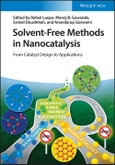Solvent-Free Methods in Nanocatalysis
Discover solvent-free approaches for the synthesis of nanocatalysts as well as various catalytic transformations in this unique one-stop resource
Solvent-free methods have attracted wide attention in organic synthesis and catalysis as a promising approach towards “greener” and more sustainable chemical transformations. In this regard, nanocatalysis has seen particular growth in recent years.
Solvent-Free Methods in Nanocatalysis gives an in-depth overview of nanocatalysts and their catalytic applications using solvent-free methods. After a brief introduction, it covers various synthetic techniques for the preparation of nanocatalysts and supports using solvent-free methods, e.g. ball-milling, microwave- and plasma-assisted methods. The book discusses in detail different catalyst classes, such as metal oxides, doped and functionalized nanocarbons, as well as nitride- and silica-based materials to help researchers to understand the efficiency and nature of these catalysts/supports based on their chemical structure. In the book readers will also find: - A brief account of the history, challenges, and recent advances in the field - Detailed discussion of advantages and disadvantages of solvent-free techniques for nanocatalyst preparation - Treatment of important solvent- and catalyst-free organic transformations (i.e. oxidation, coupling and multicomponent reactions) - A chapter on supported ionic liquids for solvent-free catalysis
Written by leading researchers in the field, Solvent-Free Methods in Nanocatalysis is a useful reference for researchers and students working in organic synthesis, catalysis, and nanomaterials science.
Discover solvent-free approaches for the synthesis of nanocatalysts as well as various catalytic transformations in this unique one-stop resource
Solvent-free methods have attracted wide attention in organic synthesis and catalysis as a promising approach towards “greener” and more sustainable chemical transformations. In this regard, nanocatalysis has seen particular growth in recent years.
Solvent-Free Methods in Nanocatalysis gives an in-depth overview of nanocatalysts and their catalytic applications using solvent-free methods. After a brief introduction, it covers various synthetic techniques for the preparation of nanocatalysts and supports using solvent-free methods, e.g. ball-milling, microwave- and plasma-assisted methods. The book discusses in detail different catalyst classes, such as metal oxides, doped and functionalized nanocarbons, as well as nitride- and silica-based materials to help researchers to understand the efficiency and nature of these catalysts/supports based on their chemical structure. In the book readers will also find: - A brief account of the history, challenges, and recent advances in the field - Detailed discussion of advantages and disadvantages of solvent-free techniques for nanocatalyst preparation - Treatment of important solvent- and catalyst-free organic transformations (i.e. oxidation, coupling and multicomponent reactions) - A chapter on supported ionic liquids for solvent-free catalysis
Written by leading researchers in the field, Solvent-Free Methods in Nanocatalysis is a useful reference for researchers and students working in organic synthesis, catalysis, and nanomaterials science.
Table of Contents
Chapter 1: Introduction to Solvent-Free Methods in NanocatalysisChapter 2: Strategies for the Preparation of Nanocatalysts and Supports under Solvent-Free Conditions
Chapter 3: Solvent and Catalyst-Free Organic Transformations
Chapter 4: Metal Oxides as Catalysts/Supports in Solvent-Free Organic Reactions
Chapter 5: Silica-Based Materials as Catalysts or Supports in Solvent-Free Organic Reactions
Chapter 6: Carbon-Based Materials as Catalysts/Supports in Solvent-Free Organic Reactions
Chapter 7: Nitride Nanostructures in Solvent-Free Catalysis
Chapter 8: Supported Ionic Liquids for Solvent-Free Catalysis
Chapter 9: Present Status & Future Outlook








